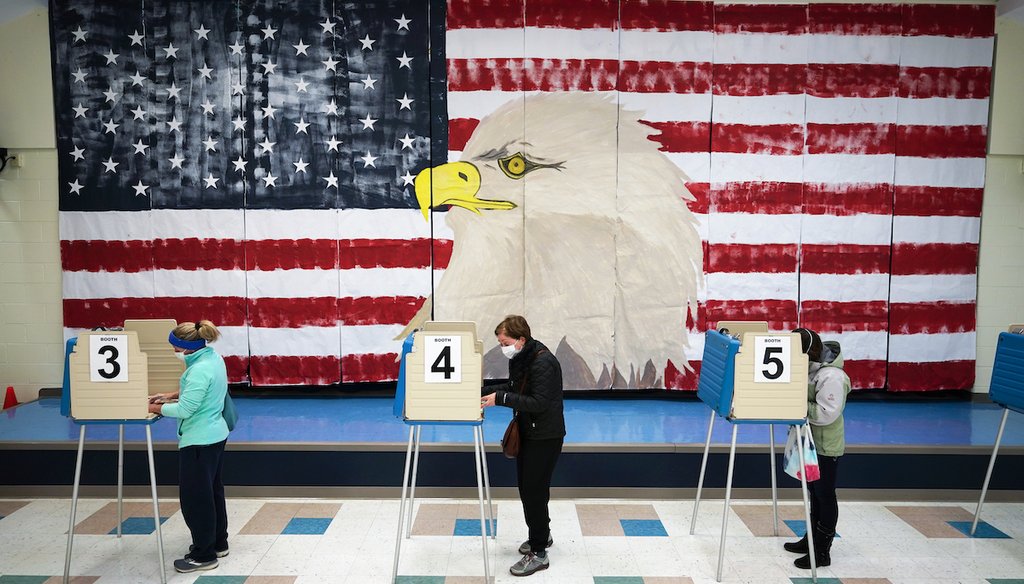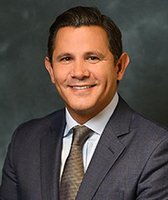Get PolitiFact in your inbox.

Voters cast their ballots under a giant mural at Robious Elementary school in Midlothian, Va., Tuesday Nov. 3, 2020. (AP)
If Your Time is short
-
The Freedom to Vote Act would create uniform national standards for voting in person and by mail.
-
The legislation is the Senate Democrats’ attempt to replace a more expansive measure that drew criticism from Senate Republicans and from Sen. Joe Manchin, D-W.V.
-
The new bill is in part a response to new voting restrictions passed by Republican-led state legislatures.
As state legislatures across the country adopt a host of voting restrictions, Senate Democrats are pushing legislation that would bring more uniformity to voting by mail and early voting.
The nearly 600-page Freedom to Vote Act represents a major overhaul of federal voting policies, though it does not go as far as the For the People Act that passed the U.S. House six months ago. The Senate Democrats sought to garner more Republican support by tweaking or leaving out some campaign finance and ethics provisions that halted its progress.
But the new version isn’t gaining traction with Republicans either.
Sen. Amy Klobuchar, D-Minn., introduced the new legislation with input from Sen. Joe Manchin, D-WV., who opposed the For the People Act. which President Joe Biden supports.
"Following the 2020 elections in which more Americans voted than ever before, we have seen unprecedented attacks on our democracy in states across the country. These attacks demand an immediate federal response," Klobuchar said in her announcement.
Democrats see the bill as a way to set uniform voting policies on mail-in ballots, early voting and voter registration, which vary widely across states. Since the 2020 election, state Republican lawmakers have passed new limits on ballot drop boxes, shortened the early voting window and introduced steep fines for election officials, among other restrictions.
The Freedom to Vote Act is potentially Democrats’ last attempt at a sweeping voting rights bill before the midterms. It is still expected to face Republican opposition; Senate Minority Leader Mitch McConnell said he opposes the new bill and wants states to retain their powers to set their own election policies.
Here’s a look at key provisions in the Freedom to Vote Act, with an emphasis on provisions that directly affect voters. Technically, the legislation pertains to federal voting rules, but practically it would be cumbersome for states to have one set of rules for voting in federal elections and another for state and local elections, as many races appear on the same ballot.
Automatic voter registration: Citizens who access government services at the Department of Motor Vehicles would have their information automatically transferred for voter registration unless they decline to do so. A previous version of the legislation mandated automatic voter registration at multiple types of agencies including those that provide public assistance to low-income people, but this version only applies to the DMV. Automatic voter registration has been implemented in more than a dozen states, including some Republican-led states.
Online and same-day registration: Requires states to offer online voter registration and same-day registration. Both policies are already in place in some states.
Election Day as a holiday: Take the day off! This would set the federal Election Day as a holiday.
Voters with disabilities and older voters: Requires states to consider policies to make it easier for voters with disabilities and older voters to avoid long lines. These might include allowing them to cast their ballot from their car, outside a polling place or in an expedited line.
Early voting: Requires states to offer about two weeks of early voting including on weekends, and at least 10 hours a day. There are some carve outs, including for jurisdictions that send everyone a mail ballot. And there are shorter hour requirements for tiny jurisdictions without the resources to provide 10 hours of voting availability.
Voting by mail: Allows any voter to request a ballot by mail without an excuse, such as being sick. The bill bans states from requiring voters to submit an ID to request a mail ballot, or to require notarization or a witness signature, which some states have required in recent years, including North Carolina.
Signature verification: If a voter’s signature on the envelope of their mail ballot doesn’t match voter registration records, election officials contact the voter via mail, telephone and if available email and text to give the voter an opportunity to fix their ballot. (Many jurisdictions already have procedures to contact such voters and give them a window of time to fix their ballot.)
Drop boxes: Sets requirements for drop boxes, which became popular during the pandemic for absentee voters to submit their completed ballots, bypassing the Postal Service. The bill sets a minimum number of drop boxes in each area based on the number of registered voters. The bill states that the drop boxes must be available starting when absentee ballots are mailed out and ending when the polls close for federal races.
Voter ID: Includes an expansive list of acceptable forms of voter ID for casting ballots in person that goes beyond driver's licenses and includes student IDs, a bank card or a recent utility bill. It also includes a work-around for individuals without ID that includes permitting a signed statement by a person who attests to the voter’s identity.
Felon re-enfranchisement: Restores the rights of felons to vote after they leave prison. Currently this process varies from state to state, although the trend in recent years has been toward restoring felons’ rights.
Food and water: The bill prohibits restrictions on food and water hand-outs to voters in line outside polling places as long as the items are given without regard to voters’ partisan preferences or voting participation. But states could still ban people from campaigning for or against candidates while they passed out snacks or water to voters. This provision is in response to rules in Georgia’s bill that ban certain food and water giveaways to voters.
Voting on American Indian lands: Due to lack of mail delivery, the bill states that an American Indian tribe may designate a location to pick up and drop off ballots.
RELATED: As extremes shape voter ID debate, the rules keep getting stricter
RELATED: Claims about HR 1 keep pouring in. Here are all of our fact-checks in one place
Our Sources
Sen. Amy Klobuchar, press release about the Freedom to Vote Act, Sept. 14, 2021
Sen. Mitch McConnell, press release about the Freedom to Vote Act, Sept. 14, 2021
President Joe Biden, Tweet, Sept. 14, 2021
National Conference of State Legislatures, Early Voting In-Person Voting, June 11, 2021
National Conference of State Legislatures, Automatic voter registration, Feb. 8, 2021
National Conference of State Legislatures, Same Day Voter Registration, May 7, 2021
National Conference of State Legislatures, Online voter registration, July 26, 2021
MinnPost, How Sen. Amy Klobuchar’s new voting rights bill differs from her old voting rights bill, Sept. 17, 2021
Bulwark article written by Kimberly Wehle, professor at the University of Baltimore School of LawThe Election-Reform Bill That Might Just Save Our Democracy, Sept. 16, 2021
Washington Post, Revised Democratic voting bill drops controversial provisions, tweaks others as pressure for action mounts, Sept. 14, 2021
Walter Shaub, senior ethics fellow at Project on Government Oversight, Twitter thread, Sept. 14, 2021
Telephone interview, Daniel Weiner, deputy director, election reform program at the Brennan Center for Justice, Sept. 17, 2021


































